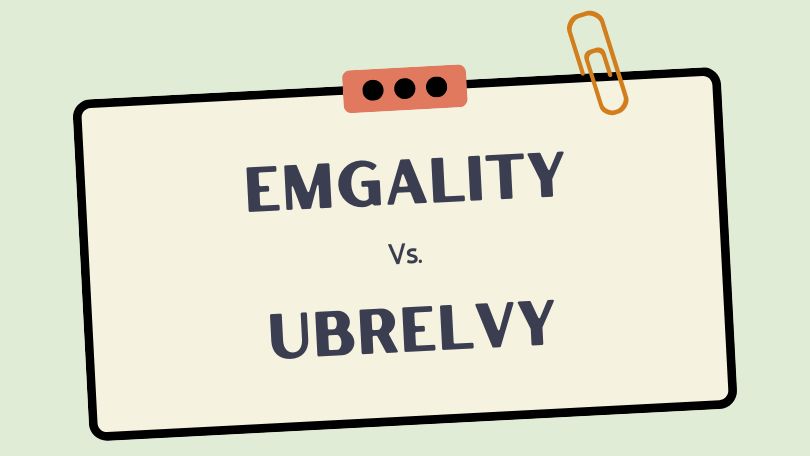Migraine is a severe headache that may be triggered by a variety of reasons, including stress, anxiety, and poor dietary habits. Several types of drugs are available to combat this illness. Two of them are Ubrelvy and Emgality. Calcitonin Gene-Related Peptide (CGRP) inhibitors are the generic names for each of these drugs. In spite of treating the same condition, they approach it in various ways.
Emgality Vs. Ubrelvy
Emgality is used to prevent migraines, whereas Ubrelvy is used to cure migraines, which is the main difference between the two. Emgality is administered intravenously, whilst Ubrelvy is a pill that is meant to be swallowed. In contrast to Emgality’s long-term approach, Ubrelvy’s is quick and provides a quick answer.
New medicine Emgality doesn’t cure migraine headaches, which is why it’s being developed. It serves as a deterrent. It is an injection-only drug that must be used once a month to maintain its efficacy. By interacting to the CGRP receptor, it inhibits its function.
A medicine called Ubrelvy is provided to those who suffer from severe migraines. If you suffer from a migraine headache, this fast-acting medication is a lifesaver. However, the negative effects of this non-narcotic medication are minimal. Only migraines can be treated with this medication. It is not possible to avoid it.
Emgality
Migraine headaches may be prevented by injecting Emgality into the bloodstream. The protein CGRP, which causes migraine pain, is blocked by this medication. In order to inhibit the CGRP receptor from aggregating, Emgality binds to the CGRP receptor.
It was licenced in September 2018 for the use of Emgality, a new medication class. Once a month, this medication is administered intramuscularly. It takes more time to get going than it used to. Adults with episodic cluster headaches may benefit from its usage. The injected region of the skin may feel discomfort, redness, and itching, but no serious adverse effects have been reported.
As one of the earliest anti-migraine medications, Emgality is a standout. There hasn’t been a lot of research on how it affects expectant and nursing mothers. To prevent this medicine in certain instances, it is best to avoid it altogether. Before using Emgality, it is important to tell your doctor about any medical conditions you may have.
Ubrelvy
Adult migraine sufferers may use ubrelvy or ubrogepant, a non-narcotic pill. Antagonizes the calcitonin gene-related peptide receptor, which is thought to cause migraines This medication kicks in quickly and should only be used by those suffering from migraines. It is portable, so you can carry it anywhere you want. It has minor adverse effects, such as nausea, dry mouth, and tiredness, and it takes effect quickly.
When a migraine attack occurs, this remedy is to be used. Despite its name, it is not a painkiller. It promises to be effective in less than two hours and provide immediate relief. A second dosage is advised if the first doesn’t relieve the discomfort. Adults are permitted to use it. The children’s efficacy has not yet been projected.
This medication should only be used under the supervision of a doctor. There are a number of medications that may interact with Ubrelvy. It is necessary to disclose the specifics of any medications being taken. If you have liver or renal illness, you should not use Ubrelvy. Women who are pregnant or planning to get pregnant should not use this medication because of the possibility that it could harm the unborn child.
Difference Between Emgality and Ubrelvy
- Both of them are migraine medicines. Ubrelvy is a treatment for an acute migraine, whilst Emgality is a preventative drug.
- Ubrelvy is a pill that may be eaten with any drink, while Emgality is an injection given once a month and administered subcutaneously.
- When compared to Ubrelvy, Emgality’s effects take longer to kick in, but Ubrelvy works immediately to alleviate pain.
- In contrast to Emgality, Ubrelvy may be used anytime the headache strikes. If the discomfort persists even many doses, see your doctor.
- These two drugs, like all others, might have unwanted side effects. Emgality is known to cause discomfort, redness, and itching in the area of the body that was injected. Ubrelvy’s adverse effects include tiredness, dry mouth, and nausea.
Conclusion
Despite the fact that they are both used to treat the same ailment, the two drugs are not interchangeable. Instead, they each have their own unique set of uses and functions. Both of them use distinct methods to alleviate your suffering.
When you’re in agony, Ubrelvy rushes to your aid, and Emgality helps to keep migraines at bay. Both of these people are competing for the same goal on the same field, thus there’s no one better than the other. They both treat the same condition, yet they’re very different from one other. The short-term relief provided by Ubrelvy is followed by the long-term security provided by Emgality.

